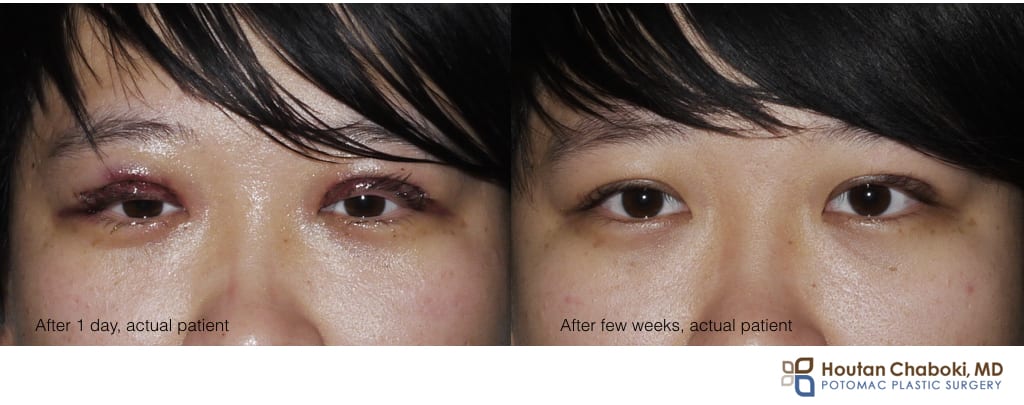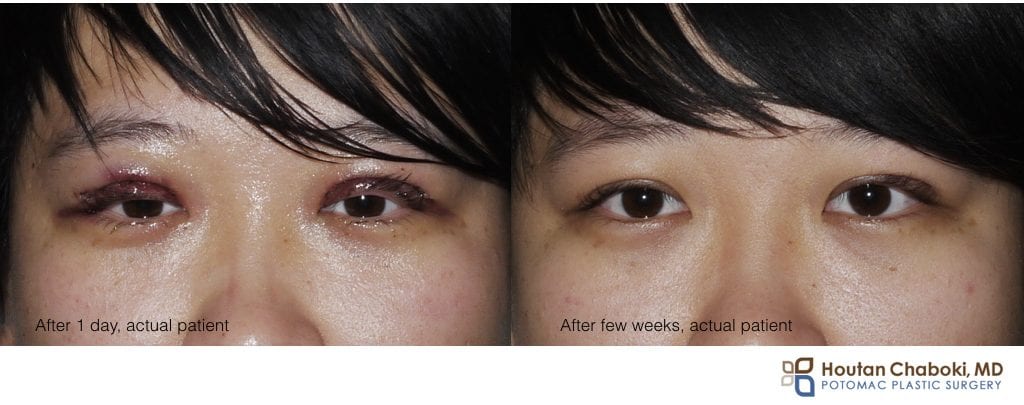
After upper eyelid surgery photographs, showing recovery one day and a few weeks after plastic surgery. Follow your plastic surgeon’s guidelines to reduce swelling and maximize recovery.
Plastic surgery patients should expect a certain degree of swelling (edema) after cosmetic surgery. Even non-surgical liquid lift patients with Botox® or Restylane® may have some swelling. Fortunately, swelling after plastic surgery usually resolves with time. Cosmetic surgery patients may proactively help reduce post-treatment swelling via a variety of natural methods.
We’ve reviewed rhinoplasty swelling in a previous post. Swelling after plastic surgery lasts for several months, even up to a year or longer, depending on multiple factors. Fortunately, a majority of the swelling resolves soon after plastic surgery. Typically, only the patient may notice residual swelling, as the area operated upon doesn’t normally draw attention from friends, family, or strangers after the initial healing period. Approximately 80% of the swelling resolves anywhere from about 4-6 weeks after surgery and continues to improve with time.
Plastic surgery swelling guidelines generally apply to most procedures, including face lift or eyelid surgery.
How to avoid plastic surgery swelling naturally
Essentially, anything that is generally good for your health is also good for your skin and helps reduce swelling after surgery. Follow the specific recovery guidelines of your plastic surgeon.
- Focus on eating fresh fruits & vegetables
- Maintain hydration by drinking plenty of fluids, such as water and juices
- Keep the head elevated to allow gravity to reduce swelling
- Consider taking certain herbal supplements, such as arnica montana and bromelain
- Apply ice
What to avoid to minimize swelling after plastic surgery
Plastic surgery patients can also help minimize swelling by proactively avoiding the following, in consultation with their surgeon:
- excess salt
- processed foods or fast foods
- spicy foods
- most herbal teas and supplements
- smoking and smoke exposure
- blood thinning medications, including aspirin and ibuprofen
What are other methods to reduce plastic surgery swelling?
Rest is important in the initial recovery period. Plastic surgeons will recommend avoiding heavy activity or exercise for the first couple weeks.
Plastic surgeons may suggest a gentle compression dressing to the area, such as an elastic neck strap after liposuction. Once an appropriate amount of healing has occurred, then your plastic surgeon may also suggest massaging the area.
Lastly, swelling may be due factors other than the plastic surgery, such as allergies, thyroid condition, hormones, medication side-effect, or other medical conditions. As appropriate, plastic surgeons may prescribe a short course of medication to help alleviate swelling, such as steroid or diuretic pills. As always, speak to your plastic surgeon to determine methods to help reduce swelling that is appropriate for you.
The above photographs demonstrate typical swelling immediately after upper eyelid surgery (blepharoplasty) and recovery by following plastic surgery recovery instructions.
Share your thoughts below.


“Lastly, swelling may be due factors other than the plastic surgery, such as allergies, thyroid condition, hormones, medication side-effect, or other medical conditions. As appropriate, plastic surgeons may prescribe a short course of medication to help alleviate swelling, such as steroid or diuretic pills. As always, speak to your plastic surgeon to determine methods to help reduce swelling that is appropriate for you.”
Would being Hypothyroid and not treating it cause swelling to last a lot longer after a rhinoplasty?
I think I may be hypothyroid so I am looking into it.
It actually was a Turbinate Reduction, Columella Narrowing and Batten Grafts taken from the Septum to treat Nasal Valve Collapse, so it wasn’t as traumatic as a usual Rhinoplasty.
It has been just over 2 years now and its noticeably swollen still, and my surgeon is at a loss.
Is this a possible reason for such slow healing?
If I was determined to be Hypothyroid and began treating it with medication, would the swelling begin to subside again and eventually get back to normal size?
Thank you for reading the blog. Swelling may be due to many factors, including hormones such as thyroid. Patients should speak with their physician if they may hormonal imbalance.
Best,
Dr. Chaboki
12 days post facelift surgery I experienced swelling one side of face and burst blood vessel in eye. I was examined by plastic surgeon and said it was all under control and I was ok to fly home. I am 20 days postfacelift and have continued to experience more swelling. What should I do. I have been to general practitioner but they openly admitted they are limited in this area. Do I need to find a plastic surgeon
Thank you for reading the blog!
Swelling occurs normally after every cosmetic surgery to various degrees, including facelift or neck lift surgery. Most swelling resolves early after plastic surgery. However, every patient is unique and swelling will vary. Facelift patients should continue to see their plastic surgeon after surgery to ensure appropriate recovery.
Read more about healing after plastic surgery in our blog, which includes helpful information for facelift and neck lift patients.
Best,
Dr. Chaboki
I had rhinoplasty performed over 30 years ago and the swelling at the tip of my nose still exists today. Is there any plan available to eliminate my swelling. Thank you.
Thank you for reading our blog!
Rhinoplasty swelling lasts a long time after surgery. The nose also can swell for many other reasons too, such as allergy or sinus conditions. We generally recommend an office visit to help to determine causes of swelling and potential remedies.
Best,
Dr. Chaboki
Is there a difference between using arnica gel and arnica pills? My girlfriend had a lift surgery because she had droopy nice and could not see and had to have it again the first time they ordered the arnica pills they didn’t order anything this time. In
Thank you for reading the blog!
Some patients report that arnica pills have reduce swelling after plastic surgery. However, we haven’t seen research on arnica. Patients should be evaluated by a surgeon to help determine appropriate treatment options.
Best,
Dr. Chaboki